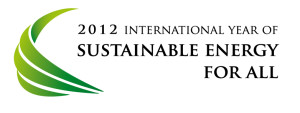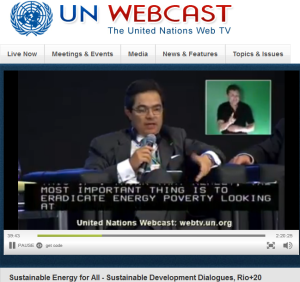Energy was raised high on the Rio+20 agenda through the UN's Sustainable Energy for All (SE4ALL) programme. The initiative seeks to achieve, by 2030, universal access to modern energy, double the share of renewable energy in the global energy mix, and double the rate of energy efficiency improvements.
WEC chairman Pierre Gadonneix was emphatic on the importance of energy efficiency to deliver on SE4ALL's goals. Speaking with Prince Albert II of Monaco on 18 June at a reception, he said energy efficiency can significantly help reduce carbon emissions and energy intensity particularly in developed and fast growing nations. But while many efficiency technologies already exist and are price-competitive, they are not being used to their full potential, he said at the reception given jointly by the UN Foundation and the Prince Albert II of Monaco Foundation.
Citing the WEC study on energy efficiency, Gadonneix said part of the challenge lies in addressing the so-called 'rebound effect' of consumer behaviour. For example, a user may choose a more energy-efficient, but larger, refrigerator, resulting in no net energy savings.
Another challenge is in transaction costs, he said. This applies particularly to the consumer space, referring to the overheads for communicating to and encouraging consumers to adopt efficiency measures. Gadonneix said the solution lies in having a clear regulatory framework which provides an energy pricing structure to incentivise behaviour change while making energy-efficient technologies cost-effective.
Energy efficiency, along with renewable energy, is instrumental in enabling universal energy access.
José Antonio Vargas Lleras, WEC vice chair for Latin America, said that increasing energy access was "of utmost priority". Reducing fossil fuel subsidies could free up substantial funding for this, he said.
Fossil fuel subsidies could be "counterproductive", he told the audience at the Sustainable Development Dialogues on 18 June. Citing recent studies which put global subsidy spending at US$400-600 billion per year, he said that diverting "just 5 or 6%" of this would provide enough to enable energy access. The money could also go towards energy efficiency and renewable energy, he added.
Vargas Lleras commented on a panel discussion with nine other experts from academia, NGOs, government, and industry who debated ways to meet the dual challenge of providing energy for the world's 1.4 billion without access while upping the use of sustainable sources for those who have.
The subject of fossil fuel subsidies was high on the Rio+20 discussion agenda. Many civil society and NGOs called for their phase-out, however their demand has not made it to the final outcome document.
Christoph Frei, Secretary General of the World Energy Council, agreed that rethinking fossil fuel subsidies is a priority, but he cautioned against eliminating them entirely.
In a panel discussion in Rio, Frei said that having the necessary skills and finance are crucial for enabling energy access. This could be provided through public-private partnerships, he told the audience at the Rio+20 Energy Day. He urged for the creation of robust financial and policy frameworks drawing on utility support. This is crucial as currently there is no utility infrastructure for electrifying rural areas.
But Frei stressed the need for tracking policy performance to ensure progress, through benchmarking metrics such as the WEC's annual World Energy Sustainability Index.
The WEC revealed earlier last week that it would be drawing on its experience from the Index to help SE4ALL to benchmark the progress of country energy policies.
While in Rio, Christoph Frei also attended several meetings of the SE4ALL High Level Group on behalf of the WEC network, where he pledged the WEC's support for the initiative.








